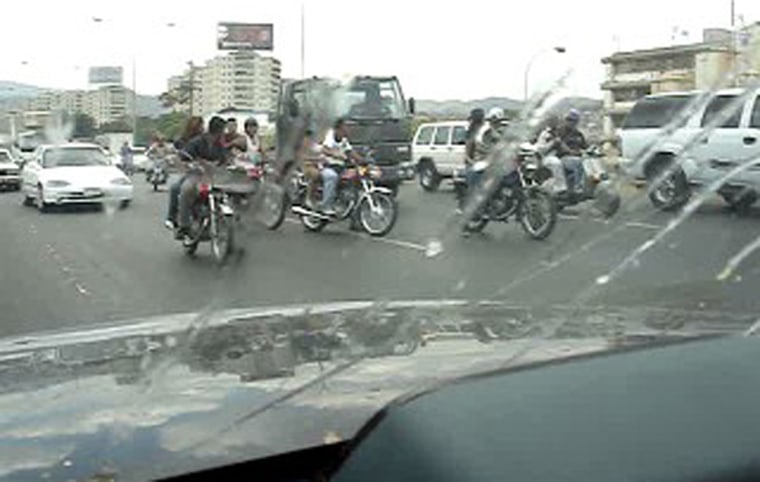Venezuela condemned a crowd of protesters for pelting the U.S. ambassador’s car with eggs and tomatoes, but suggested Saturday there were areas in the country that the top U.S. diplomat might consider avoiding.
Venezuela’s acting foreign minister, Alcides Rondon, criticized the “excesses committed” as inexcusable, but said the U.S. Embassy was no longer giving police escorts advance word of the ambassador’s travel plans that might help avert such incidents.
“We must be clear: in our country’s political situation there are places where the presence of some people is not welcome,” he said.
Rondon said U.S. Ambassador William Brownfield had chosen an inopportune time to donate baseball equipment to a youth league in a poor neighborhood embroiled in a controversy over restricted access to the ballpark.
‘Severe diplomatic consequence’
Brownfield has grown used to facing protests and shouts of “Yankee go home,” but supporters of President Hugo Chavez appeared to have crossed the line Friday when they pounded on his car and chased after his convoy on motorcycles.
Washington summoned Venezuela’s ambassador after the confrontation and warned him of “severe diplomatic consequence” if there is a similar incident again.
It was the third time in three weeks that Brownfield has been met by protests. Earlier, demonstrators burned tires and torched an American flag.
Emotions have run high among Chavez’s supporters as he has accused the United States of plotting against him. American officials have denied it while accusing Chavez of stifling democracy.
Rondon said Venezuela guarantees all diplomats free movement. But he also said the Americans had ordered Venezuela’s secret police escorts to leave the embassy building and be posted outside after a U.S. military attache was expelled in February on spying accusations.
Since then, the ambassador’s itinerary generally “isn’t known by our security agencies,” he said.
U.S. claims Venezuela condoned attack
Rondon said Venezuela was not asking the ambassador to submit his travel plans for approval, but suggested police need better notice to improve security.
U.S. Embassy spokeswoman Salome Hernandez insisted prior notice is already given for such events.
“The embassy does coordinate with local authorities when we travel,” she said. “And we will continue to exercise our right to travel throughout the country.”
The State Department said Friday’s incident “clearly was condoned by the local government,” with local officials handing out snacks to perpetrators at the stadium. U.S. officials accused police of doing nothing, saying a single city police car stayed well behind the convoy while motorcyclists pounded and kicked the ambassador’s car.
The Caracas mayor’s office denied involvement, and Rondon insisted local police intervened immediately after they were notified.
Brownfield told Voice of America radio that the protesters who were “stoning, egging, tomatoing,” identified themselves as members of the Tupamaros, a group known to Chavez opponents as gun-wielding toughs but which in recent years has renounced violence and formed a pro-Chavez political party.
Rondon, however, said some of those involved were simply “moto-taxi” drivers.
